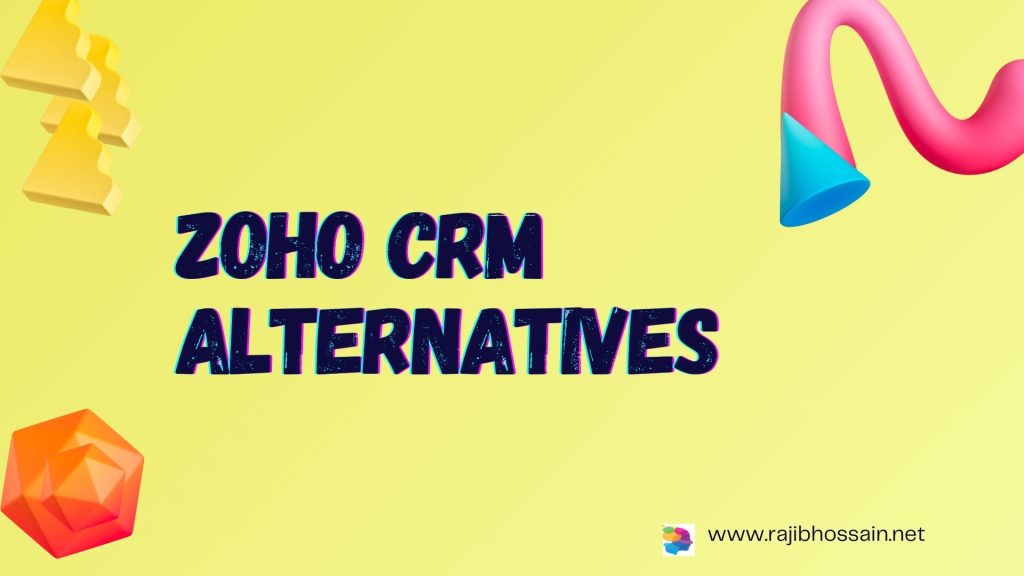
Introduction
Customer Relationship Management (CRM) systems are vital tools for businesses looking to manage customer interactions, streamline processes, and improve sales and service. While Zoho CRM is a popular choice, numerous alternatives offer unique features, pricing, and advantages. This article explores some of the best Zoho CRM alternatives, detailing their key features, benefits, and ideal use cases to help you make an informed decision for your business.
Top Zoho CRM Alternatives

1. Salesforce
Key Features:
- Comprehensive CRM with sales, service, and marketing automation.
- Highly customizable with a vast range of integrations.
- Advanced analytics and AI-driven insights.
- Scalable solutions for businesses of all sizes.
Benefits:
- Robust ecosystem with extensive third-party app support.
- Strong community and support resources.
- Powerful reporting and forecasting tools.
Ideal For:
- Large enterprises and businesses with complex needs.
- Organizations seeking extensive customization and scalability.
2. HubSpot CRM
Key Features:
- Free basic CRM with upgradeable sales, marketing, and service hubs.
- User-friendly interface and easy setup.
- Email tracking, lead management, and pipeline management.
- Integrated marketing tools like email campaigns and social media management.
Benefits:
- The free tier offers robust features for small businesses.
- Seamless integration with HubSpot’s marketing and service tools.
- Excellent customer support and resources.
Ideal For:
- Small to medium-sized businesses.
- Companies looking for an easy-to-use, all-in-one solution.
3. Pipedrive
Key Features:
- Sales-focused CRM with visual pipeline management.
- Customizable pipelines and stages.
- Email integration and automation.
- Reporting and sales forecasting tools.
Benefits:
- Intuitive interface designed for sales teams.
- Strong mobile app for on-the-go access.
- Affordable pricing plans.
Ideal For:
- Small to medium-sized sales teams.
- Businesses seeking a straightforward, sales-centric CRM.
4. Microsoft Dynamics 365
Key Features:
- Comprehensive suite combining CRM and ERP capabilities.
- Advanced AI and machine learning tools.
- Deep integration with Microsoft products (e.g., Office 365, Azure).
- Customizable workflows and business processes.
Benefits:
- Scalable solutions for growing businesses.
- Robust data security and compliance features.
- Strong analytics and business intelligence tools.
Ideal For:
- Medium to large enterprises.
- Organizations heavily invested in the Microsoft ecosystem.
5. Insightly
Key Features:
- CRM with project management and marketing automation.
- Contact and lead management.
- Workflow automation and custom app-building tools.
- Integration with G Suite, Office 365, and popular business apps.
Benefits:
- Combines CRM and project management capabilities.
- Customizable dashboards and reports.
- User-friendly interface and setup.
Ideal For:
- Small to medium-sized businesses.
- Companies need both CRM and project management features.
6. Freshsales (Freshworks CRM)
Key Features:
- AI-powered lead scoring and sales analytics.
- Email and phone integration with built-in communication tools.
- Workflow automation and customizable pipelines.
- Visual sales pipeline and deal management.
Benefits:
- Intuitive and easy-to-navigate interface.
- Affordable pricing with feature-rich plans.
- Strong integration with Freshworks suite of products.
Ideal For:
- Small to medium-sized businesses.
- Sales teams seeking a user-friendly, AI-driven CRM.
7. Nimble
Key Features:
- Social CRM with robust contact management.
- Unified message inbox for email and social media.
- Relationship tracking and engagement tools.
- Seamless integration with G Suite, Office 365, and social networks.
Benefits:
- Excellent social media integration.
- Easy to use with minimal setup.
- Focus on relationship building and contact management.
Ideal For:
- Small businesses and solopreneurs.
- Companies leveraging social media for customer engagement.
8. Copper (formerly ProsperWorks)
Key Features:
- Native CRM for Google Workspace (G Suite) users.
- Automated data entry and workflow automation.
- Email tracking and templates.
- Robust reporting and analytics tools.
Benefits:
- Seamless integration with Google Workspace apps.
- Minimal manual data entry is required.
- User-friendly and intuitive design.
Ideal For:
- Small to medium-sized businesses using Google Workspace.
- Teams seeking a CRM with minimal data entry and automation.
Conclusion
Choosing the right CRM is crucial for managing customer relationships, improving sales processes, and driving business growth. While Zoho CRM is a strong contender, alternatives like Salesforce, HubSpot CRM, Pipedrive, Microsoft Dynamics 365, Insightly, Freshsales, Nimble, and Copper offer unique features and advantages that may better suit your specific needs. Evaluate your business requirements, budget, and desired features to select the CRM that will best support your growth and success.
FAQs
1. What factors should I consider when choosing a CRM? Consider factors such as ease of use, customization options, integration capabilities, scalability, pricing, and customer support.
2. Are there free CRM alternatives to Zoho? Yes, HubSpot CRM offers a free tier with robust features suitable for small businesses.
3. Can I switch from Zoho CRM to another CRM easily? Most CRMs offer data migration tools and support to facilitate switching from another CRM platform. Ensure the chosen CRM provides adequate migration assistance.
4. How do CRMs help improve customer relationships? CRMs help manage and analyze customer interactions, track customer data, and automate communication, leading to more personalized and efficient customer service.
5. Is it necessary for a CRM to integrate with other business tools? Yes, integration with other tools like email, marketing automation, and project management software can enhance the CRM’s functionality and streamline workflows.
6. Which CRM is best for sales-focused businesses? Pipedrive and Freshsales are particularly well-suited for sales-focused businesses due to their strong sales pipeline and deal management features.
7. Can CRMs support remote work environments? Yes, most modern CRMs offer cloud-based solutions with mobile apps, enabling remote access and collaboration.
8. How important is customization in a CRM? Customization is important as it allows businesses to tailor the CRM to their specific processes and workflows, enhancing efficiency and user adoption.
